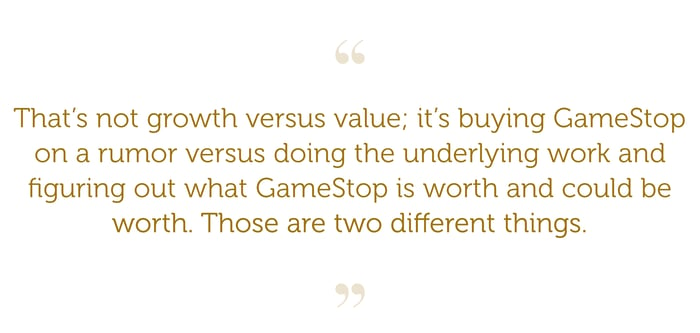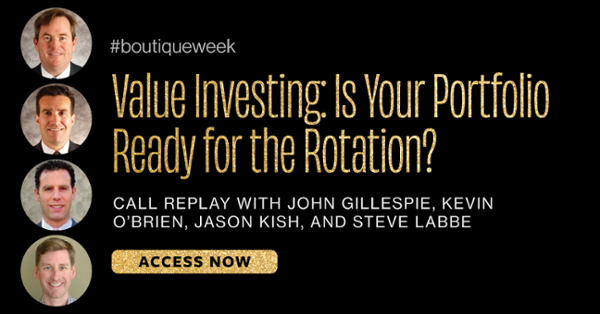Prospector Portfolio Managers John Gillespie, Kevin O’Brien (CFA), Jason Kish (CPA, CFA) and Steve Labbe (CFA) recently conducted a video conference call with Stacy Havener, Founder & CEO of Havener Capital Partners, as part of the Havener Capital Partners Boutique Week event. They discussed 2021’s rotation toward value stocks as well as aspects of today’s market that remind them of the dot-com bubble, among other relevant topics.

Stacy Havener brought up a theme that was discussed during the 2020 Boutique Week, which was the capitulation of some value investors after such a long period of value’s underperformance versus growth. John noted that while some investors he follows, such as Howard Marks, didn’t throw in the towel, they have offered some evolved perspective on the growth versus value debate. Here is an excerpt from John’s response:
John Gillespie: Probably the most prominent of those letters [from 2020] was the Howard Marks letter where he talked about being quarantined during COVID with his son, who's a venture capitalist, and how they had a lot of conversations around growth investing versus traditional value investing. I don't think Marks capitulated at all. But what he said, which I agree with, is that growth investing and value investing are not mutually exclusive, and I think that's right. I mean, I think that's a dichotomy that's been created by the modern portfolio theorists and the consulting community, and people like Morningstar, who are trying to fit the world into a matrix and categorize people. I think value is value and growth is growth, and so I would like nothing better than an opportunity to buy a great company at a reasonable price. That's value investing, and that particular company is great probably because it's growing. And so, I think I agree with Marks in saying they're not mutually exclusive.
Among the other things that he said, a lot of them were rules about how the [asset management industry] has changed over time, which I would agree with. Information is more ubiquitous and more efficient. So, it's harder to find sustained periods of inefficiency, and I would agree with that. He highlighted the premium to continue to do fundamental research. I think one of the things in battle today in the market are the fundamentalists versus the non-fundamentalists. That's not growth versus value; it's buying GameStop on a rumor versus doing the underlying work and figuring out what GameStop is worth and could be worth. Those are two different things. And then the last thing he talks about, which is something else I agree with, is he said mean reversion has been an important element for traditional pure low-valuation value investing, and mean reversion can be very expensive. I call it cutting your flowers to water your weeds, and I just don't think you want to do that over and over again.
So, I agree that mean reversion has become a less relevant rule to follow. But I agree with most of what he said, and I think that they're not mutually exclusive, and the best environment for us is when we can buy really good companies at reasonable prices.
Interested in hearing more on topics related to the new economic cycle, inflation and value investing? Check out the full video call with the portfolio managers titled Value Investing: Is Your Portfolio Ready for the Rotation? Click on the graphic below to get started.


